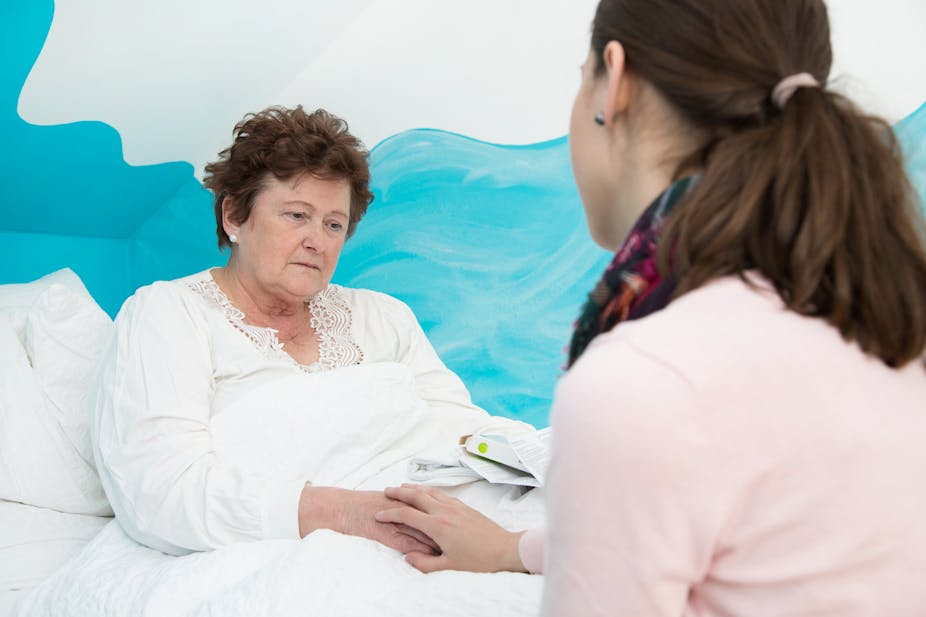Evidence shows lone mothers suffer from poorer health on average than women with partners. But the situation isn’t as clear cut as this might suggest.
For physical health, many of the observed differences between lone and partnered mothers are mediated by socio-economic factors. That means, once you account for the difference in mothers’ income and status, whether they’re single or not has little impact on their health.
But a gap for mental health is much harder to explain in this way. Lone mothers are much more likely to suffer from depression and mental ill health even after their socio-economic position is accounted for.
This picture recently became even more complex. A recent Harvard study showed women that women who had ever experienced lone parenthood were more likely to have health problems after the age of 50 - even if they had long ceased to be single parents.
The scarring effect of lone parenthood on health outcomes is not yet well understood. There is emerging evidence that lone parenthood has lasting effects on women’s economic outcomes, including their wealth, income and employability. But the new study showed that, in England, even after adjusting for these factors, health differences still remained.
Lingering problems
So what other explanation might there be for health deficits among previously lone parents? The Harvard study suggests that a lack of social support from other family members may be one possible explanation for poorer health. Another is that the stresses of combining work and family may have contributed towards a higher risk of poor health in later life.
An alternative hypothesis is that poor mental health among lone mothers may in itself be an important driver of physical health problems later in life. Poor mental health frequently precedes physical health problems, and is an important risk factor for a range of health problems such as coronary heart disease. A lack of social support among lone mothers has a direct and important effect on mental well-being, and it may be through this channel that we see links to later-life health outcomes.

Lone mothers may also face greater difficulties in reconciling work and family life, as they do not have an additional adult to share chores and childcare with. This may also help explain their higher rates of mental health problems. However my own research for the Nuffield Foundation has shown that work can lead to substantial improvements in mental health among lone mothers. Indeed, in the mid-2000s, lone mothers who worked were no more likely to have poor mental health than those with partners, and had much better mental health than those not in work.
As more women have joined the workforce, employment has become an increasingly important provider of identity and self-esteem, including for lone mothers. These factors are as important to mental health as the financial benefits of employment.
But being able to achieve a satisfactory balance between work and childcare is also important to mental health. It is more important than level of earnings, type of job, or the career prospects that lone mothers hold. And increasing amounts of government-subsidised childcare in the UK has made this balance easier for lone mothers to achieve.
Greater recognition
Policy makers should also recognise the diversity of experience of lone parents, and the risks of poor health vary greatly. Those that divorce, for example, appear to face worse health outcomes at older ages than those that have children outside of marriage or are widowed.
This perhaps reflects the fact that divorced women, who have spent much of their time in a relationship, are most likely to have expected to rely on their partner for their economic well-being in the future. Data from the British Household Panel Survey showed that these women are most likely to have reduced their employment or moved to part-time work upon becoming parents. As a result, they may suffer greater economic penalties to single parenthood than those that become single parents while already alone.
Today, with more than more than 40% of children having experienced some time living in single-parent households by the age of 16, the health of lone mothers matters more than ever. Health inequalities have increasingly risen up the public health agenda. But lone mothers, who remain among one of the most economically disadvantaged groups, continue to face health risks that are even worse than those for other similarly economically disadvantaged women. And they remain largely absent from major public health reviews.

